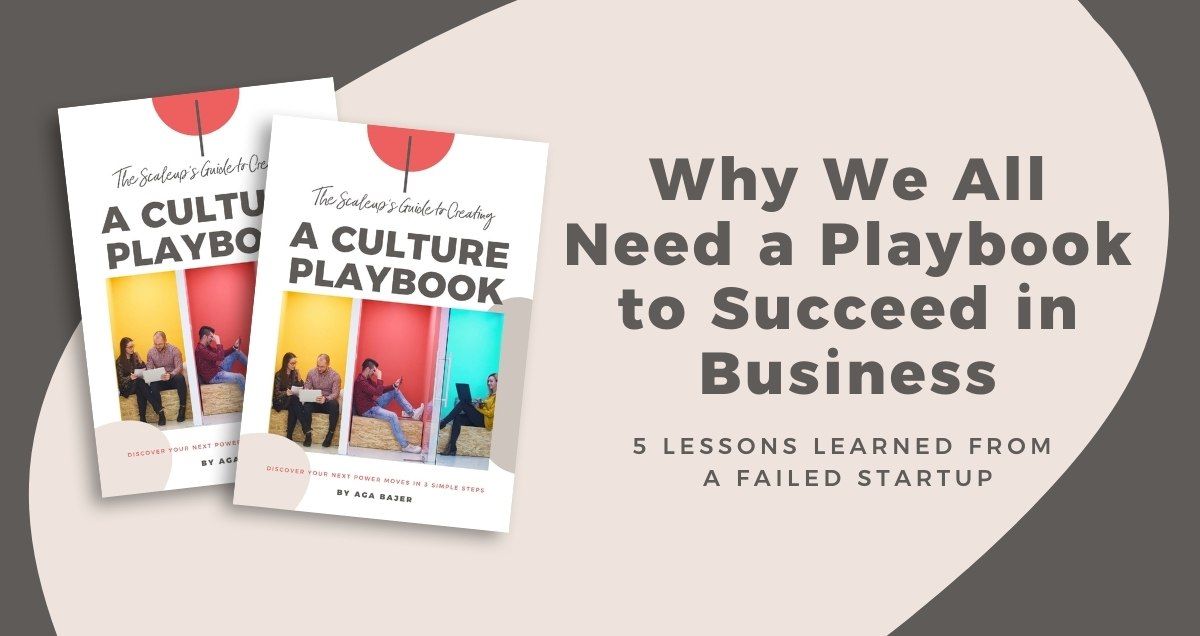
Why We All Need a Playbook to Succeed in Business
When I was a kid, I’d watch my Dad create weird-looking sketches.
“What is it, Dad?” – I demanded to know.
“It’s a game plan.” – Dad said, looking up from his drawing.
“What is it for?”
“It helps you win a game.”
That gave me a pause. I knew that Dad was a basketball coach; I knew that his team had recently won the National Championship. What I didn’t know was that his job entailed drawing. Now, that was puzzling – because, frankly, he was pretty bad at it!
“How could these messy squiggles help Dad’s team become national champions?” – I wondered.
Here is the story of my Dad and his approach to coaching his basketball team. It’s also the story of my first startup’s failure and the five lessons I learned from both.

Lesson 1. A playbook comes before a game plan.
When I asked Dad about his sloppy sketches, he was amused:
“A game plan doesn’t have to be beautiful – it just has to work. But even when it works, it can only win you that set play. To win a game – and especially a championship – you need way more than a game plan.”
And then, he pulled out a leather-bound book from his bag. His playbook.
It looked almost like the Bible – heavy, serious, uninviting. Definitely not the kind of book I wanted to be read from before bed.
Dad’s playbook was where he’d clip in all his best game plans. But the most crucial part, he told me, were the first pages. They contained notes on his coaching philosophy, the guiding principles for his team, and a few simple rules he expected his players to live by.
Key takeaway
We are hard-wired to solve problems. That’s why we love our game plans so much. We often act as if a good product-market fit, a great business plan, a smart strategy are everything to succeed in business. But the opposite is true:
A playbook comes before a game plan. Before you figure out what you need to do to succeed, you need to know WHY you are in the game and HOW you want to play it.
Lesson 2. Laser-like focus can make you blind.
In my late 20s, I quit my job, moved to Greece, married a guy I knew just for a few months, and set up my own business. All at the same time.
Many parents would freak out but my Mum and Dad seemed strangely unphased at first.
But one day, as my parents were visiting us in Greece, my Dad said over dinner:
“I love it that you are so determined to make this business work, honey.”
I beamed.
“But you really need to take a step back,” — he continued.
“A step back?!” —I felt a pang of annoyance, even disappointment.
“You know, doing business is not so easy. Business is a game,”- he continued. — And he lost me right there. I couldn’t help but think: “Uh-oh, here comes the sermon. Dad is putting his coach hat on!” And so he did.
He talked for what seemed like an eternity. About how there was no point focusing on a game plan without a playbook — especially without those crucial first pages that would guide me in the long term. He insisted that the first thing I should figure out was the impact I wanted to have on the people I served.
I didn’t want to storm off from the dinner table. So I pretended to listen to Dad’s advice. And then, true to my rebellious streak and undoubtedly driven by our unique family dynamics, I proceeded to… ignore it. Entirely.
To be fair, at the time I wasn’t in the right headspace to accept advice from anyone. At 28, after quitting my cushy job, leaving the country, and moving to Greece, I felt like I needed to prove that I wasn’t crazy, that it all made perfect sense. I didn’t have the luxury of time or money to focus on what sounded like a bunch of lofty ideals. And what did Dad know about business, anyway? I wanted to be successful, I needed to be successful to prove to the world that I was right and the world was wrong.
And so, I got obsessed with building that business — as if my whole life depended on it.
Despite living right by the seaside, I worked 16-hour days and hardly stuck my nose outside. I put every fiber of my being into launching the company. People questioning the viability of my idea only got me to push harder.
I kept reassuring myself: “I have the product-market fit. I have a good business model. I have many prospective clients. This will be great!”
I had my eyes fixed on the prize — a vision of success that I craved with an intensity of a junkie looking for a hit of drug of their choice. It kept me going. What I didn’t know at the time was that that the vision made me blind to the most important realities of business success. It was like I was participating in a race on a rocky path, near the edge of a cliff and I chose to run barefoot and blindfolded.
Key takeaway
Our culture fetishizes grit and determination, focus, and hard work. We want to be the heroes of our own stories, to win, to save the day, to accomplish something extraordinary. It might seem paradoxical but it’s true:
In order to win in business, we need to take the focus away from our own success and zoom in on the success of those our business was created to serve.
Lesson 3: You fail gradually, then suddenly.
In Hemingway’s The Sun Also Rises, one of the key characters, Mike Campbell, is asked:
“How did you go bankrupt?”
“Two ways,” he answers. “Gradually, then suddenly.”
That’s exactly how I went bankrupt, too. Gradually, then suddenly.
I burned through all my life savings first. Then, I borrowed some money from my in-laws. I maxed out my credit cards. It still wasn’t enough. And after a year, my runway was gone. I had no money, no clients, no mojo. The race was over because I fell off the cliff and crashed. And at the end of it, all I was left with was a bruised ego and a crippling debt.
Key takeaway
When we veer off course by one degree, it doesn’t seem like much at first. But little things compound and can lead to a catastrophe if we don’t pay attention early enough. It’s good to ask ourselves this question on occasion?
If we don’t course-correct today, where might we end up in a year from now?
Lesson 4: When you fail, own it, make amends, and move – asap.
I struggled to digest the failure of my first startup for years. My confidence was crushed. Facts were hard to accept. I was terrified of reflecting on the whole experience. Because, how do you admit that you’ve given something your all – your heart and your soul – and you were still unable to pull it off? What does it say about you?
Like many failed entrepreneurs, I was in the grip of shame for a long time.
Shame is destructive on many different levels. But the worst part is that it prevents us from learning and moving on. We can’t live fully in the grip of shame because we are suspended in a limbo, held hostage by our own interpretation of what had happened at some point in our life and what it says about us.
We stay trapped until we can look shame straight in the eye and say:
“Fine, you are right! I messed up pretty bad. But you know what? It doesn’t define me. I’m going to make amends to those I hurt and forgive myself for being human. I’m moving on and you are not coming along.”
Key takeaway
I wasted a lot of time not owning my failure. I blamed Greece, the market, the lack of funds, instead of admitting that I messed up and making amends to those who were hurt in the process, and learning from the whole experience. Looking back, I know that this was exactly what held me back.
Failure sucks but we can make it suck less if we own it, learn from it, make amends and move on asap.
Lesson 5: True success comes only when you are in sync with your playbook.
I’m not sure whether something specific triggered the shift that finally allowed me to move on. But I certainly have a strong, sensory memory of the moment it happened. I felt like something has melted away. Suddenly, I had a sense of softness and warmth in my chest instead of the tightness and heaviness. I was driven by a force that seemed to know what needed to be done. I went to a bookstore. I breathed in all the smells I love – paper, books, fresh print. I wondered around and finally stopped. I looked at the stand in front of me. It was full of Moleskin notebooks. They looked beautiful. I pulled one out and took it to the cash register. It was black. I paid for it and went outside. I sat on a bench, opened the notebook, and wrote the word “Playbook” at the front. As I turned to the second page, I wrote a couple of questions:
“Why am I in the game?”
“What impact do I want to have on those that I serve?”

It took me years to figure it all out. I added more questions on the way. But at that moment, as I was sitting on the bench near the bookstore, for the first time in a long time, I knew I’d be fine.
I had my playbook – it was right there, on my lap. All I needed to do was fill it in. And then, keep getting my life in sync with what was in it.
I guess that having failed at a business I wanted so much to work, made me wrestle with this question for so many years:
What sets a company up for success?
I joined consultancies like Hay Group (now Korn Ferry), and PwC to figure it out. Then, I struck out on my own again. And as I’ve worked with scores of teams, from VC-courting startups to Fortune 500, I kept being curious. I observed, tested, tweaked, and tested again. I wanted to know what works and what doesn’t – what needs to remain constant and what needs to evolve.
And I discovered that to grow successfully and make a true dent in the world, you need more than a great idea, loads of passion, capital, smart strategy, or even the most talented people on your team.
You need to bring everything and everyone that matters in sync. Like in a game. Because after all, my Dad was right:
Business is a game. And you can’t play it well without a playbook.
A playbook is simply not optional. Period. Not for an individual and certainly not for a business. Not if you want it to succeed. This is as true for a 10 people enterprise as it is for one that employes 10.000 team members. The more people there are, the more vital it becomes to have a playbook. Today I call it the Culture Playbook.
A good Culture Playbook consists of:
A Mission Statement.
It answers the questions:
- “Why are you in the game?
- “How do you want to impact those you serve?”
A Vision Statement.
It answers the questions:
- “What is the game you want to play?
- “How do you serve, and what impact do you want to have?”
The Core Philosophy.
It answers the question:
- “What is the core belief that got you in the game in the first place?”
The Core Values.
They answer the questions:
- “What do we value most?
- “What are the principles that help us play our best game?”
The Core Desired Feelings.
They answer the question:
- “What is the emotional impact we need to have on the employees and customers to play our best game?”
They are what I refer to as the Big Five.
Key takeaway
In combination, the Big Five can become the most essential enabling constraint for a business. While your company grows and evolves, they are the elements that help you navigate the uncharted territories in a way that is consistent with what you stand for and who and how you want to serve.
There is a sweet spot from which you can maximize success: it’s where your brand promise, your products, your employees, and the people you serve are in perfect harmony – in sync. What makes this possible is operationalizing your Culture Playbook.
Invincible cultures and businessed are a by-product of discovering, articulating, and operationalizing their Culture Playbook.
❖❖❖
P.S. My dad (second from the left) is almost 80 today and he still coaches a team near his hometown – and still uses his playbook (which he has now fully digitalized)! So here is to never giving up, always learning, playing a good game and letting our playbook guide us on the journey!

If you haven’t already, you can download The Scaleup’s Guide to Creating a Culture Playbook here. Follow the 3 steps I lay out in the guide to start growing with purpose and building a remarkable culture that sets you up for success.
Want more tips on evolving culture?
Subscribe to my newsletter, the CultureLab Insider, and get the new blog posts, podcast episodes
and other free resources delivered to your inbox every Tuesday.

